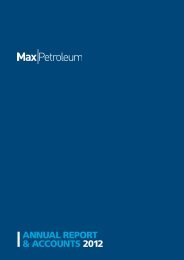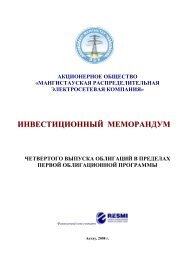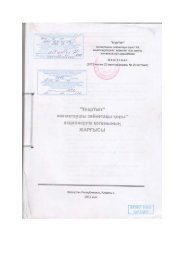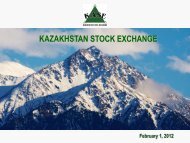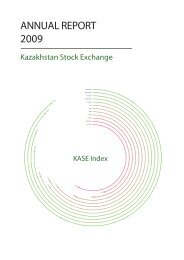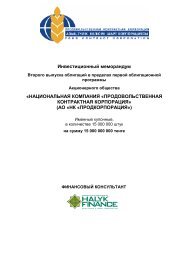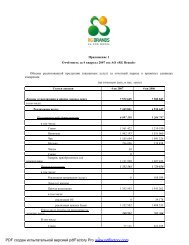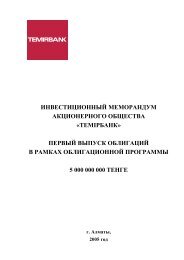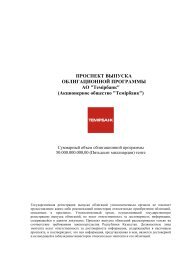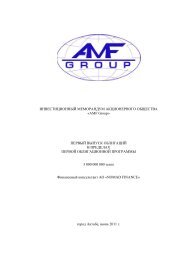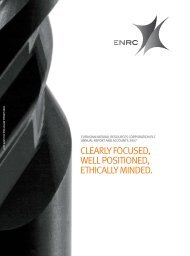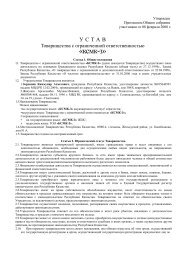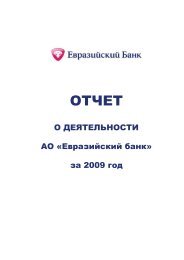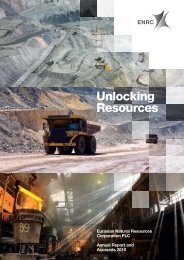JPMorgan - KASE
JPMorgan - KASE
JPMorgan - KASE
Create successful ePaper yourself
Turn your PDF publications into a flip-book with our unique Google optimized e-Paper software.
Š completion of the gas utilization project.<br />
As of September 30, 2002, we had expended in excess of $100 million with respect to these<br />
capital projects and we expended an additional $40 million over the balance of 2002 and expect<br />
to expend a further $167 million during 2003, as follows ($ in millions):<br />
Upstream including joint ventures ..... $135.2<br />
Downstream........................ $ 17.6<br />
MarketingandTrading .............. $ 8.1<br />
CorporateServices................... $ 6.1<br />
We believe that cash-on-hand, cash flow from operations, our working capital facilities, the net<br />
proceeds of this offering and, subject to satisfaction of conditions precedent, the remaining<br />
borrowings under our new Term Facility will be sufficient, after giving effect to redemption of<br />
our Senior Notes, to fund our capital expenditure program for the balance of 2003.<br />
Commitments<br />
We committed to the Kazakhstani government to invest $280.0 million in HKM by the end of<br />
2002 and $150.0 million in HOP by the end of 2001. As of September 30, 2002, we believe we met<br />
both of these commitments. If the Kazakhstani government fails to recognize the investments we<br />
have made, we may be required to pay a penalty of 15% of the shortfall to the Kazakhstani<br />
government, which could have a material adverse effect on our financial condition and results of<br />
operations.<br />
Of the items included within our 2003 capital budget, we are legally committed to expend the<br />
following ($ in millions):<br />
QAM pipeline construction project ..... $27.8<br />
Gas utilization program ............... $ 7.3<br />
Refinery............................. $ 0.2<br />
Risks<br />
Foreign Exchange Risks. We report in U.S. dollars. Export revenues are denominated in U.S.<br />
dollars, and domestic sales of refined products and crude oil are made in the Tenge equivalent to<br />
U.S. dollars as of the date of sale. The majority of our operating costs are denominated in Tenge.<br />
Our exposure to the Tenge is through the net bank balances maintained and the tax basis of our<br />
capital assets. For tax purposes our accounts are maintained in Tenge. We have the possibility to<br />
revalue the tax basis of our assets using the official annual rate of inflation. Any currency<br />
movements in excess of the annual inflation rate will generate exchange gains and losses upon<br />
conversion to U.S. dollars. As of January 1, 2002, the tax legislation was changed such that our<br />
Downstream operations no longer have the possibility to revalue the tax basis of their assets. As<br />
our Upstream operations have tax stability provisions within their hydrocarbon contracts, they<br />
still have the possibility to revalue the tax basis of their assets. There is no significant forward<br />
market in the Tenge, therefore, we do not hedge this exposure.<br />
Commodity Prices. The price received for crude oil and refined product sales is linked to world<br />
oil prices and, in the case of export FCA sales, is net of transportation and other related costs.<br />
Although the price received for refined products is linked to world oil prices, there may be<br />
significant time lags in the adjustment process and the relationship between the net back for<br />
crude oil exports and refined product sales may vary from time to time. We did not hedge<br />
commodity price risks in 2001. During the second quarter of 2002 we began to hedge a portion<br />
of our commodity price risk by implementing a minimal forward sale program (for 45,000 tonnes<br />
per month).<br />
FCA Differential / Transportation. Our most significant expenditure is the FCA differential or, in<br />
the case of non-FCA sales, the cost of transportation. The construction of the QAM pipeline and<br />
access to the CPC and other pipelines to the extent we are able to negotiate such access will help<br />
address this issue. The completion of the QAM pipeline is expected to lower the costs for<br />
exported crude oil by approximately $2.00 to $2.50 per barrel shipped.<br />
53



